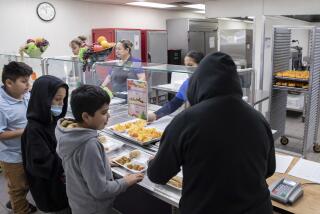PERSPECTIVE ON CHILDREN : Food, Shelter, Care--Then Learning : The cry for better schools is admirable but misplaced. Deeper problems are sabotaging education.
- Share via
We are not meeting the basic needs of too many of our children. Until we do, they cannot learn. In our search for quick educational fixes and bottom-line results, this major deficiency is consistently overlooked.
Significant change in our educational system is sorely needed. However, there is a dichotomy between what we are led to expect of education and the reality of what our children can actually get from education. Over the long term, this dichotomy will doom to failure our efforts at educational improvement.
In the 1950s, Dr. Abraham Maslow defined a hierarchy of needs that children must satisfy before they can learn. Maslow wrote that children need a home, bed, food, family, freedom from danger, peer acceptance, love and self-esteem. Once these basic needs are met, a child is capable of significant learning, self-expression and curiosity. But in our society, too many children do not have these basic needs met. In their homes, on school campuses, neighborhoods, even in churches and synagogues, children are no longer guaranteed safe haven. They may lack warm meals or a bed at night.
Today, we couch our concern for educational reform in terms of valid hand-wringing over competition with other countries, not in terms of children’s basic needs. Concerned CEOs are right when they say America needs competent workers in order to compete effectively. But effective competition is a byproduct of real learning, not a goal. Educators are properly concerned that children be educated to enrich their own lives. Enriched adults are not only competent workers but competent citizens.
There are no quick fixes to intractable societal problems that confuse and complicate educational goals. Educators should be willing to examine critics’ charges, but the critics must understand that they are demanding more teacher responsibility for children’s basic needs than ever before. That increased responsibility comes at the same time that support institutions outside the schools are crumbling. Too many children have lost the ability to learn in their scramble merely to survive.
If we heed the call for a national standardized testing system that assesses teaching and pits the children who have against those who have not, are we also prepared to help the have-nots make up the difference? If we demand school choice, will our children be better able to learn? If we demand more school days, will intellectual capacity increase? In the current environment, the answer is probably no.
Classroom teachers are more and more the designated caretakers of our children. The results of single-parent homes, two-working-parent homes, inadequate day-care availability, poverty, violence and language and cultural barriers ultimately land in the classroom.
Now teachers worry that meals provided at school are a child’s main daily nutrition. School health screening may be the only health care children get until they need an emergency room. Sometimes kids sleep in class because they are homeless or live in hostile homes and can’t sleep anywhere else. Children don’t have shoes; families lack enough warm clothing for every child. In urban centers, walking to school itself can be a threatening experience. Thus, attending to the Maslow hierarchy becomes imperative.
We are right to be critical of outmoded educational structures and seek new learning systems and funding mechanisms for schools. But we must remember that schools alone cannot take care of our children. Schools need help from outside: family support systems, health-care systems, religious and spiritual guidance and physical security. The schools and our children need a community-wide nurturing system to support education.
Teachers are doing a Herculean task, given the realities of the lives of their students and the schools’ lack of resources to deal with this overwhelming assignment. But no teacher can replace a parent’s love and care. No teacher’s praise can give a child the self-esteem a mother or father can. No teacher can provide a safe home environment, three nutritious meals a day or a spiritual context unique to a child’s own family experience. Until we address that reality, new educational systems and funding mechanisms can’t ensure that our children will be ready to learn when they walk in the schoolhouse door.





